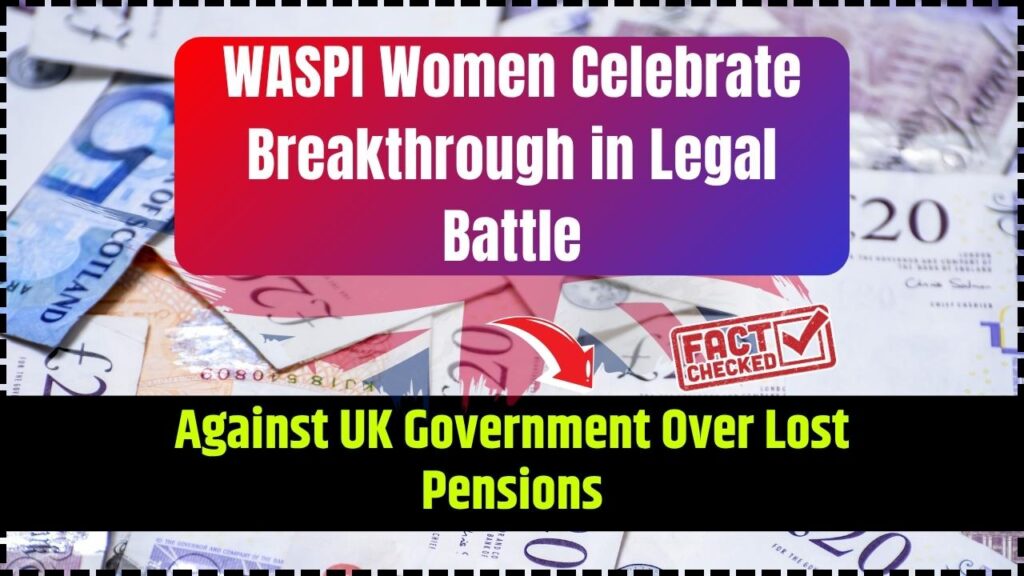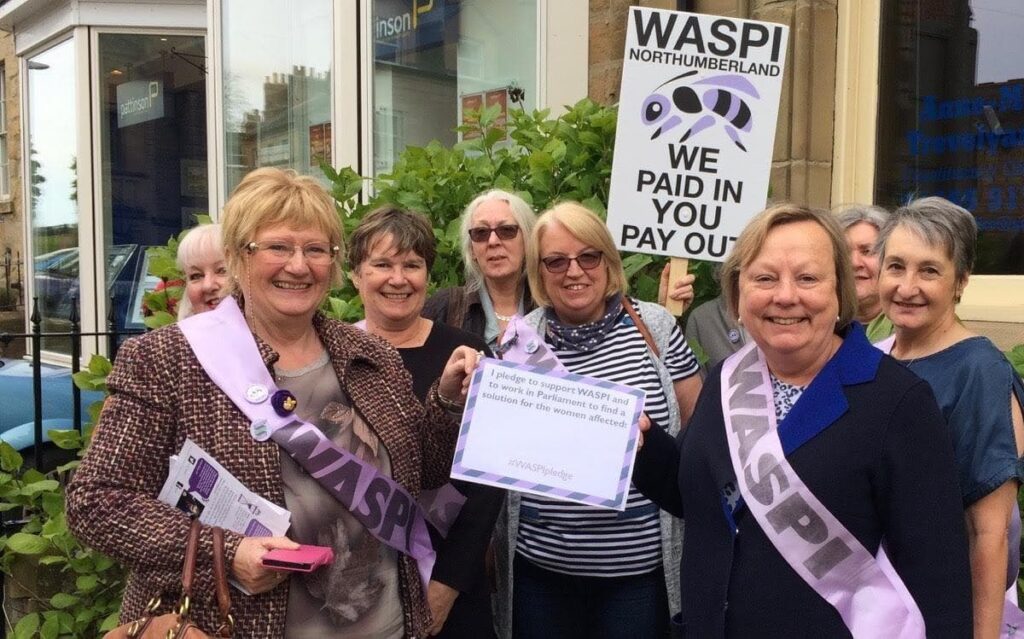
WASPI Women Celebrate Breakthrough in Legal Battle: The WASPI (Women Against State Pension Inequality) movement has recently celebrated a significant legal victory that may change the course of their ongoing battle against the UK government over lost pensions. For over a decade, these women, many of whom were born in the 1950s, have fought against changes in the state pension age that left them unprepared for retirement. A recent court ruling marks a vital step forward in this legal struggle, bringing hope to the 3.6 million women who have been affected by these pension age changes. But what does this victory really mean for WASPI women, and how can this case affect the future of pension policy in the UK?
WASPI Women Celebrate Breakthrough in Legal Battle
The recent legal victory for the WASPI women marks a crucial moment in their fight against the UK government’s pension age changes. It’s a step forward for justice, and it’s proof that persistence, public support, and strategic legal action can make a difference. With the potential to set a major precedent, this case will likely shape future legal battles over public sector decisions and the importance of effective communication between governments and citizens. As the case continues, the WASPI women remain determined to secure the compensation they deserve. This legal victory not only highlights the importance of standing up against injustice but also demonstrates the power of collective action. The WASPI case serves as a reminder that change is possible, even in the face of significant challenges, and that the voices of those who have been wronged can still make a lasting impact on policy.
| Key Fact | Details |
|---|---|
| Legal Victory | WASPI women secured a vital legal safeguard to limit their liability for legal costs to £60,000. |
| Court’s Decision | The High Court ruled that the Department for Work and Pensions (DWP) must pay up to £90,000 towards WASPI’s legal fees if they win the case. |
| Affected Women | Approximately 3.6 million women born in the 1950s who were affected by pension age changes. |
| Pension Age Changes | The state pension age was increased from 60 to 65, then to 66, without adequate notice. |
| Compensation for Affected Women | The Parliamentary Ombudsman recommended compensation, but the government rejected it, leading to this legal challenge. |
| Public Support | A majority of the public believes that these women should receive compensation. |
For years, the women involved in the WASPI campaign have been fighting an uphill battle against the government’s decision to raise the state pension age for those born in the 1950s. These women were expecting to retire at 60, but the UK government made changes to raise the pension age to 65 and, later, to 66. The changes were implemented without proper notice, and many women found themselves facing unexpected financial hardship. In fact, a report from the Parliamentary and Health Service Ombudsman (PHSO) found that the Department for Work and Pensions (DWP) failed to adequately inform women about these changes. As a result, the Ombudsman recommended compensation for those affected, but the UK government rejected this idea in December 2024.
However, recent legal developments have brought new hope to the WASPI women. A June 2025 ruling in their favor by the High Court in the UK brought them a significant victory in their legal battle against the government. The court issued a “costs capping order” that limits the WASPI group’s liability for legal costs to just £60,000. This crucial ruling protects the campaign from potentially disastrous financial penalties should they lose their legal challenge. In contrast, if they win, the DWP could be required to cover up to £90,000 in legal costs. This legal protection removes the financial burden that had previously threatened to derail the case.

Understanding the WASPI Case: Why is it So Important?
To understand why this legal case is so important, we need to dig into the background of the WASPI women and the pension age changes that sparked the movement. Originally, the state pension age in the UK for women was set at 60. This was the retirement age many women relied upon when planning for their future. However, in 1995, the UK government announced plans to raise the pension age for women from 60 to 65 to equalize it with men’s retirement age. A few years later, in 2011, the government decided to further increase the pension age to 66 for both men and women.
The problem, however, was that many women didn’t receive enough notice about these changes. According to the PHSO’s report, the DWP failed to properly communicate with women about the shift in pension age. This lack of communication meant that many women found themselves unprepared for a delayed retirement, causing significant financial strain. These women were left with little to no time to adjust their retirement plans, especially those who had already made life decisions based on their anticipated pension age of 60.
The WASPI movement was born out of this frustration, as women banded together to demand that the government provide compensation for their lost pensions. They argued that the government’s failure to adequately notify them about the changes constituted maladministration, and that they should be compensated for the financial hardship they had endured as a result. The campaign has gained widespread support, with surveys showing that the majority of the public believes these women deserve compensation.

WASPI Women Celebrate Breakthrough in Legal Battle: What’s at Stake?
This legal victory is a big deal for several reasons. First, the ruling makes it clear that the government cannot simply ignore the issue of pension age changes. The court’s decision to limit the financial risks for the WASPI women means that they can continue their legal fight without the constant fear of crippling legal fees. If they win, the DWP will be forced to pay up to £90,000 towards their legal costs, a victory that would strengthen their case and set a precedent for future cases involving government maladministration.
Additionally, this ruling has the potential to shift public opinion on the issue of pension compensation. If the court ultimately rules in favor of the WASPI women, it could encourage more women (and other groups affected by public sector decisions) to seek legal redress for past wrongs. More importantly, it could signal to the government that it is time to reconsider how it communicates and handles pension-related issues in the future.

Steps for Other Campaigners: What Can We Learn?
The WASPI case offers valuable lessons for others seeking justice in legal battles. Here’s what other campaigns and individuals can learn from the WASPI movement’s fight:
1. Leverage Public Opinion
The WASPI campaign has consistently engaged with the public, creating awareness about the issue through petitions, social media, and media outreach. By keeping the conversation alive and making the issue relatable, the campaign has garnered significant public support. In fact, public opinion has been a key factor in pushing the government to the negotiation table.
2. Seek Legal Safeguards
The High Court’s costs capping order is a key development in this case. It shows that, even in complex and high-stakes legal battles, it is possible to negotiate protections that can reduce the financial risks associated with litigation. Legal safeguards, like this one, allow grassroots campaigns and vulnerable groups to fight for justice without fear of financial collapse.
3. Stay Persistent
The WASPI women have been fighting for over a decade. Their persistence has been a critical factor in their success. It demonstrates that when a campaign is rooted in justice, it can withstand years of setbacks and still push forward with determination. Many of these women have spent years raising awareness, attending protests, and engaging in legal action. Their determination should be a model for anyone seeking to right a wrong.
4. Build Strong Legal and Advocacy Networks
Throughout their fight, the WASPI women have partnered with legal experts, public figures, and advocacy groups to bolster their case. By building a robust support network, they have been able to amplify their message and create lasting momentum for their cause.
5. Keep the Issue Relatable
The WASPI campaign has focused on making the issue personal. Instead of abstract discussions about pension age, the women have shared their stories, highlighting how the changes impacted their lives. By putting a human face on the issue, they have made it easier for the public to relate to their struggles.
WASPI Women to Get £3,150? Key 2025 Payment Details, Eligibility Rules & Timeline Revealed
Pensions Revolution Incoming? Rachel Reeves’ Plan Could Redirect Billions into UK Economy
UK Driving Licence Overhaul Incoming – What Every Driver Must Know in 2025!











